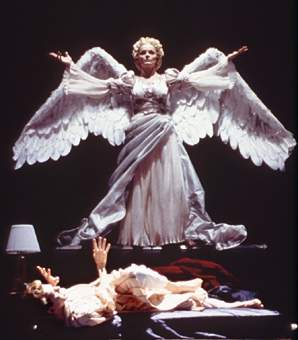It is the cinema screen upon which we project our contemporary mythologies and the television screen which reflects the mores of today’s living rooms. It is to the television screen, therefore, that we should look to see how far the US has come in its attempt to treat all people equally without regard to their colour, creed, or sexuality. Indeed, despite what I have said above, it is a hopeful sign of today’s attitudes that homosexuality and queer culture have not only become acceptable to the mainstream but seem to be equated with the trendy and the fashionable. Now is the time, though, while gay=fashionable, while homosexuality is hot, to talk about the possibilities and limitations of its portrayal on the television.
 In the election campaign just passed both sides were pitching for Reagan Democrats, while ignoring the Gipper’s ignoble record of homophobia. Tony Kushner’s multiple award-winning Angels in America, with its damning indictment of a President whose bigoted administration left tens of thousands to die of AIDS because they were not part of ‘normal’ society (i.e. because they were exotic, just like the Fab Five), functions in a way analogous to Queer Eye. We love the show, but its substantive legal/political program seems to have been forgotten, just like Reagan’s involvement in the Iran-Contra scandal and a multitude of other sins.
In the election campaign just passed both sides were pitching for Reagan Democrats, while ignoring the Gipper’s ignoble record of homophobia. Tony Kushner’s multiple award-winning Angels in America, with its damning indictment of a President whose bigoted administration left tens of thousands to die of AIDS because they were not part of ‘normal’ society (i.e. because they were exotic, just like the Fab Five), functions in a way analogous to Queer Eye. We love the show, but its substantive legal/political program seems to have been forgotten, just like Reagan’s involvement in the Iran-Contra scandal and a multitude of other sins.
And yet, as we saw in the campaign, despite the steady rightward drift of economic policies that so that even Kerry makes Nixon look like a socialist, the contemporary mainstream does maintain a rhetoric of diversity -- and even neo-conservatives must pay lip-service to it. It shows how far we have come when Bush, with all his kowtowing to the intolerant religious extremists in his party, would not condemn homosexuality per se in his move to deny gays the right to marriage or civil union. It is likewise astounding that, less than a generation since queers and communists were accused of undermining and overthrowing American values, Dick Cheney (a man not known for his commitment to personal freedom) should state publicly that he was familiar with the issues because his daughter was a lesbian and that “freedom means freedom for everyone.” This is the consolation of lost elections: just as Nixon prevailed in 1968 and 1972 while the country drifted leftward, so Bush prevailing now does not mean we are not, also, moving to the left on certain issues. Indeed, it might be more apt to say that right-wing candidates succeed precisely because the country is moving leftward, as Americans vote their fears of an evolution they seem unable to arrest.
The changes in the social terrain are evidenced by media artefacts like Queer Eye. But their effect depends upon how they are interpreted. If Queer Eye is “read” as a circus full of freaks, it can serve to domesticate gays and keep them in their second-class place. On the other hand, if it is read as a celebration of difference and an affirmation of underlying humanity, then, with the efforts of GLAAD and the like, it has already made gay marriage a possibility that makes sense in the living rooms of America. Perhaps, in order to appeal to the widest audience, the show deliberately remains open to both interpretations. In order for the cycle by which society portrays, reflects, and then imitates itself to “work,” these shows should not be read as something obvious, to be taken for granted, but as a starting point for conversations such as this one.

Is Jonathan Caouette's acclaimed film a documentary, dream, or mirror?
November, 2004
Artists on 9/11 and the war on/of terror
October, 2004
Reality and rhetoric in an election year
October, 2004
September, 2004
July, 2004
Faux feminism on the silver screen
June, 2004
The Zeek interview
May, 2004
The News from San Francisco
March, 2004
May Tricks: Reel-or-Dead?
June, 2003
Jewish sex radicalism in the New World Order
May, 2003
Will the controversial rapper be America's next working class hero?
December, 2002
Tips and advice from my first gay year
October, 2002
How to be Spike Lee instead of another Clocker
October, 2002



Straight Eye for the Consumer Guy
Dan Friedman
I'll Say Goodbye and Let you Go
Abigail Pickus
Three Jewish Books on Sadness
Jay Michaelson
Sufganiyot
Rachel Barenblat
The Other Jews: Secularism, Kabbalah and Radical Poetics
Hila Ratzabi
A Jewish Masterpiece
David Zellnik
Archive
Our 580 Back Pages
Zeek in Print
Fall/Winter 2004 issue now on sale
About Zeek
Mailing List
Contact Us
Subscribe
Tech Support
Links
From previous issues:
Primal Scream Judaism
Temima Fruchter
Becoming Jewish-ish
Jeff Leavell
Elephant Memory
Jay Michaelson
 Email us your comments
Email us your comments